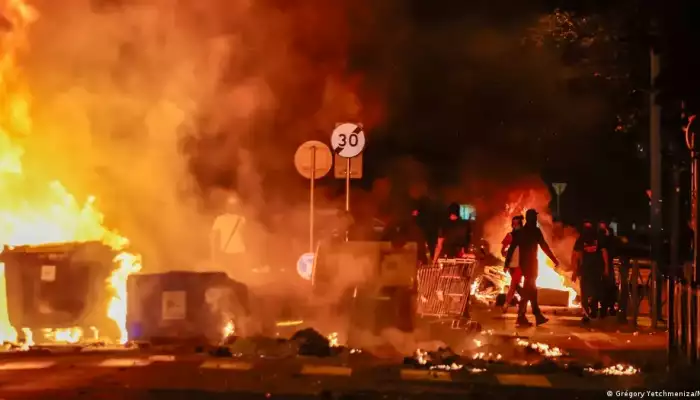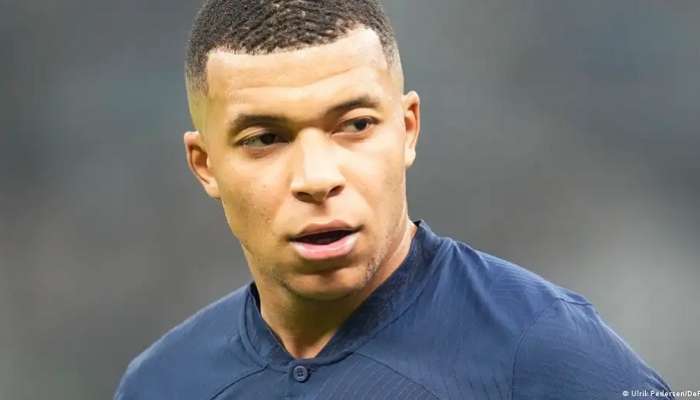

France: "I'm annoyed. When I hear certain words, it hurts. When they say they want to 'clean up,' what do they mean? Clean up what? Clean up who? I take it to mean me. Because I grew up in the banlieues."
Those were the pained words of a French World Cup winner after the conflict between the French police and the inhabitants of Parisian banlieues had resulted in a fatal tragedy and spiraled into violence.
"Or when they say we're scum. Why use a word like that? They used to say that I was scum. I'm not scum; I just wanted to work."
But they weren't the words of French superstar Kylian Mbappe, nor did they refer to the death of Nahed M., the 17-year-old shot by police after attempting to flee a traffic check in the western Paris suburb of Nanterre last week, or the nationwide rioting which has followed since.
In fact, they were the words of former French international Lilian Thuram, speaking in 2005 after the deaths of Zyed Benna (17) and Bouna Traore (15) — electrocuted after hiding from police in a power station on the opposite side of Paris in Clichy-sous-Bois — had prompted a similar descent into public disorder.
In the almost two decades since, little has changed in the relationship between the French state, its police force and some of its most disadvantaged citizens. The poverty, violence, distrust, disenfranchisement, unemployment, crime and — underscoring all of it — the racism, all remain.
But one aspect is different. In 2005, Thuram, a member of France's famously multicultural World Cup-winning team just seven years earlier, was a lone voice among prominent French footballers addressing the social unrest in the areas in which many of them had grown up. Even Zinedine Zidane, the most prominent and iconic member of that team and who grew up on the notorious Marseille estate of La Castellane, remained silent.
Lilian Thuram (right, battling with Portugal's Luis Figo at Euro 2000) was the only member of France's 1998 World Cup winning squad to speak out about the problems in the banlieues.
How French football players reacted to recent riots
"A young man shot down at point-blank range by a policeman for failing to comply with a check — this is the reality and it is dramatic," wrote Barcelona defender Jules Kounde, who was born in Paris but who grew up near Bordeaux.
"A bullet in the head. It's always the same people for whom being in the wrong leads to being dead," responded AC Milan goalkeeper Mike Maignan,who was born in French Guiana but began his football career in the northern Parisian suburb of Villiers-le-Bel.
"Nahel could have been my little brother. It breaks my heart when I hear his mother because I hear the voice of my mother," wrote Real Madrid midfielder Aurelien Tchouameni in an emotional open letter.
"I want to understand why, for years now, teenagers die during seemingly innocuous police checks. Why the trigger seems so much lighter when it's a certain type of person. Why it's taken a viral video to prevent the affair being covered up. Nahel was our little brother. And in France, fraternity should still mean something."
Bayern Munich youngster Mathys Tel, just one year older than Nahel, wrote on Instagram: "You were 17. I'm 18. We both come from the banlieues of Paris. It's hard to tell myself but it could have been me. Death for a mistake — is that the response?"
Senior team captain and Paris Saint-Germain superstar Mbappe wrote just six small words: "J'ai mal à ma France" ("my France pains me") before posting a longer statement on behalf of the whole national team. In it, Les Bleus expressed their understanding of the anger but appealed for an end to the violence.
"Since this tragic event, we have been witnessing the expression of a popular anger whose substance we understand, but whose form we cannot endorse," they wrote, describing a sense of powerlessness in the face of what they called a process of self-destruction.
"For many of us, coming from working-class neighborhoods ourselves, we share these feelings of pain and sadness, [but] violence solves nothing, even less so when it inevitably turns back against those who express it, their families, their loved ones, their neighbors. It is your property that you are destroying, your neighborhoods, your cities, your places of fulfillment."
Has social media given French footballers a voice?
What has changed? For former Lyon, Fulham, Marseille and Wolfsburg striker Steve Marlet, who also made 23 appearances for France between 2000 and 2004, modern players simply have better tools of communication at their disposal.
"We had opinions on current affairs, too, but the big difference is that we didn't have access to social media," he told 20 minutes, a daily newspaper in France. "Back then, if we'd wanted to react, we would have had to contact a journalist. But today, the players can formulate a reaction in a couple of minutes in their living room and relay it to the world."
Sports sociologist Patrick Mignon, a researcher at France's National Institute for Sport, Expertise and Performance (INSEP) in Paris, agrees that social media plays a role, but adds that the current generation of players have had more rounded educations.
"Mbappe, for example, is not just a symbol of sporting success; he was brought up and influenced by parents who were active in sport, and who understood the value of sporting discipline, the importance of sport in peoples' social lives," he tells DW.
"Also, there has been a shift in focus in the training centers which these players go through, which don't just provide elite sporting training, but also offer educational qualifications.
"Finally, at least in terms of the French national team, many of these players have gone abroad to develop and play, and they return with different values, having seen and experienced different countries and cultures."
France's current generation are much more outspoken on socio-political issues than their predecessors
But is anybody listening?
The players have spoken. But, as French football magazine SoFoot asked this week, "has anybody listened to them?"
Sociologist Mignon tells DW that, traditionally, footballers were not considered in France to be figures with much to say. Respected and admired for their sporting prowess, perhaps, but not with the same moral or social standing sometimes accorded to athletes in Germany or the United Kingdom.
"The media weren't really interested in asking us about anything other than football anyway," confirms Steve Marlet. "But if someone had given me a microphone after the riots in 2005, I would have had my say."
That, however, is changing, especially in the banlieues once again at the center of the disturbances.
"[Mbappe] is the prototype model footballer who has become a leader of opinion," says Marlet. "People now expect him to take a position on such subjects and he expresses himself well. It's a departure from the cliche of the footballer incapable of putting two words together."
"For the young people of the banlieues, under constant social pressure, facing the threat of police violence and living with a sense of being trapped, these players are considered to be role models and examples of success," explains Mignon.
"For the 'grands-freres' (the 'big brothers') of the banlieues, players such as Mbappe serve as role models. For the younger teenagers, many of whom play football themselves in clubs, these players are idols."
That was certainly the case for Theo Luhaka, the 22-year-old left temporarily paralyzed from the waist down as a result of police violence in the Paris suburb of Aulnay-sous-Bois in 2017.
After being visited in hospital by French internationals Franck Ribery and Moussa Sissoko, he told SoFoot at the time: "They're simple lads, really nice. I had a good feeling chatting to Ribery. He was genuine, he didn't mince his words. Like many kids from the estates, it was my ambition to be a footballer, too."
France has been rocked by violent clashes since the shooting of a 17-year-old boy by police last week. And it's not the first time.
'Their idols are footballers. But they need other idols, too.'
Ribery and Sissoko weren't the last players to make socio-political statements beyond the pitch and, in 2021, members of France's 2018 World Cup winning team co-founded the Generation 2018 foundation, focused on the topics of health, equality and education.
"We are lucky that we can reach people with the platform that we have, and that we can show our personalities beyond football," explained Kounde in October last year.
"I want to share the things which I think are right, that's natural for me. We can speak freely, even if there are still some who say: 'You're a footballer, stay in your lane, stick to football.' But we can't cut ourselves off like that."
Nevertheless, while French footballers have undoubtedly found their voices as role models, it is not their role to tackle the many social problems facing French society, or to bridge the gap between the police and some of the country's most disadvantaged citizens.
"On the estates, there are rules whereby you respond to aggression with aggression. And the kids feel like they are the targets of aggression," Lilian Thuram said in 2005.
"I'm sad for them, but we need to reflect. Often, their idols are footballers. Which is fine. But they need other idols, too."